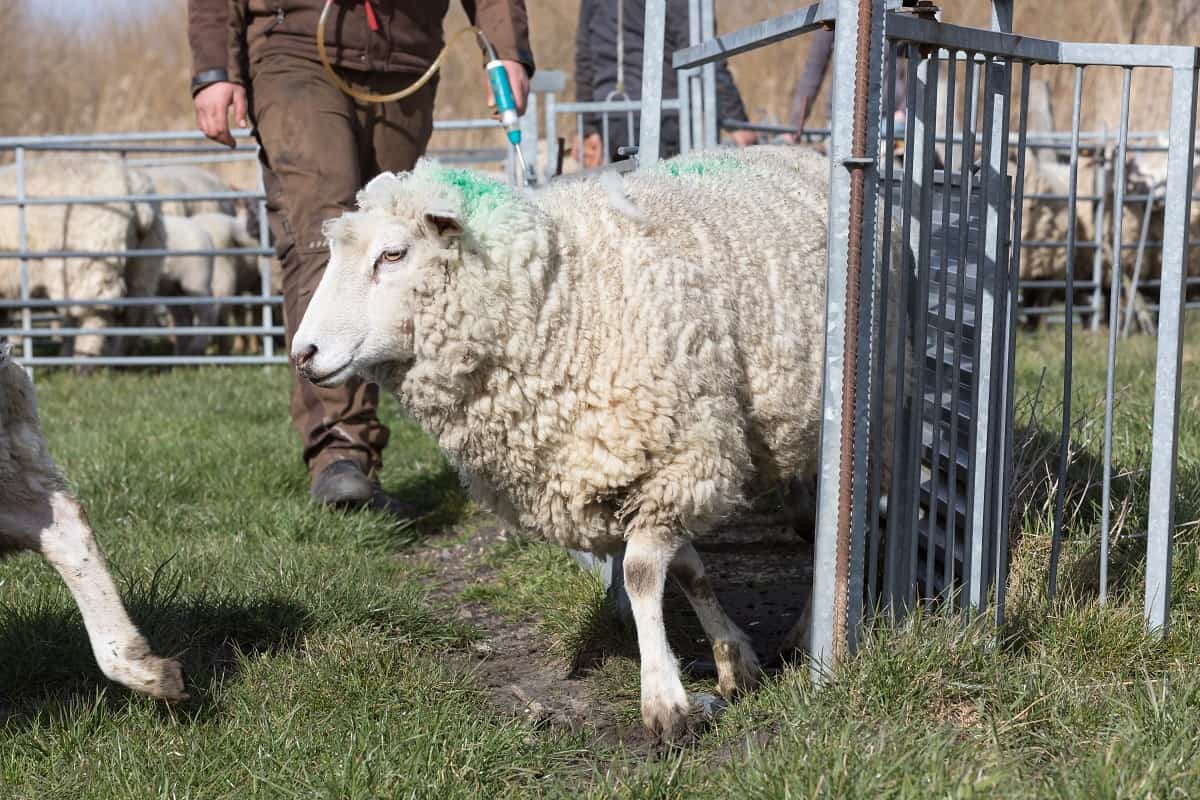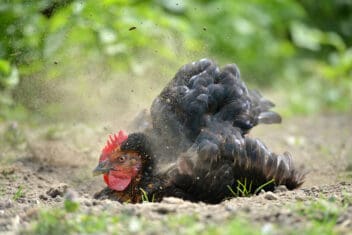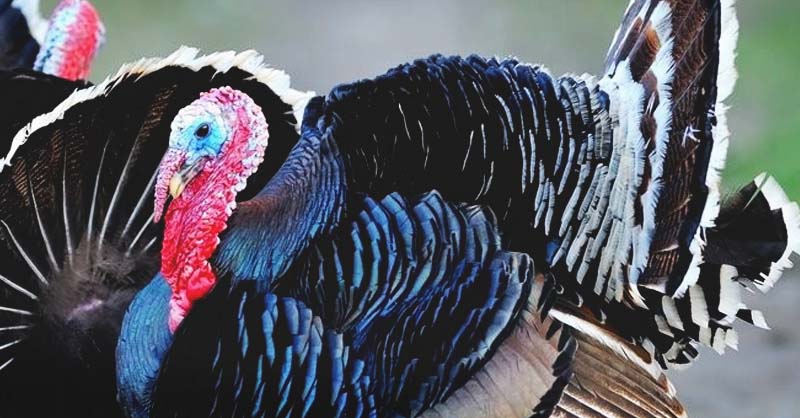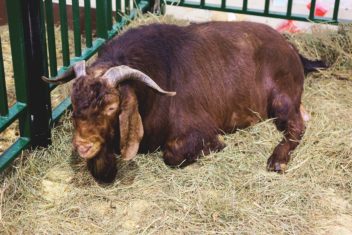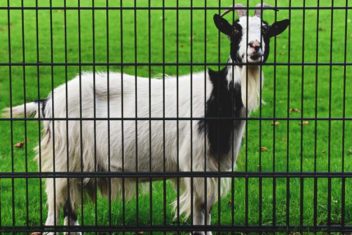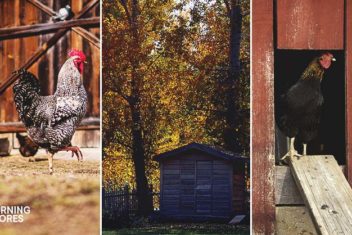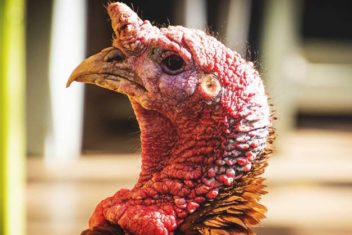It’s no secret that of all livestock species, sheep and goats tend to be the most susceptible to internal parasites.
Some vets will argue that all sheep are always in a state of “worminess” and it’s simply a matter of keeping those worm populations as low as possible rather than getting rid of them entirely.
That might be discouraging to the new flock owner, but it’s a reality of shepherding that you need to be aware of if you want to be successful (and more importantly, keep your animals healthy).
So how often should you deworm sheep? It varies, but it’s likely more often than you think.
Here’s what you need to know.
How Often Should You Worm Your Sheep?
As I mentioned, it’s impossible, unrealistic, and frankly, unnecessary to expect to eliminate all internal parasites in your sheep. They can tolerate a small level of internal parasites with no consequences to their health.
However, if you live in an area where the weather is warm and humid (or if you’re working with sick or otherwise sensitive animals), knowing how often and how to deworm your sheep is essential.
The frequency at which you should deworm varies, but usually, it is once every 3-4 weeks.
That’s the simple answer.
The more complicated answer is that you need to fine-tune your worming program to meet the needs of your flock.
Lambing Timeline for Worming

For example, ewes that are lambing on pasture should be dewormed about 2 weeks before they lamb. That’s because parasite egg numbers dramatically increase in ewes immediately before and immediately after they lamb. The larvae will reproduce quickly, just in time for lambs to start grazing – and of course, this leads to further infection.
If you don’t deworm before lambing, it needs to happen when you lamb. You should also move the sheep to fresh pasture to be safe.
Lambs should be wormed regularly, starting at 6 weeks of age. It’s important to note that mature ewes are going to be much more tolerant of worms than lambs are.
Finally, you should deworm any time you introduce new sheep to the flock. Mixing untreated sheep in with those that have been treated already will negate all your previous efforts in preventing parasites in your flock.
Because it’s so easy to overdose sheep with dewormers, I recommend using the FAMACHA system and only deworming when it’s necessary. Look for those with pale eyelids and are underweight. Both of these are signs that your sheep need to be wormed.
How Long After Worming Sheep Are Worms Expelled?
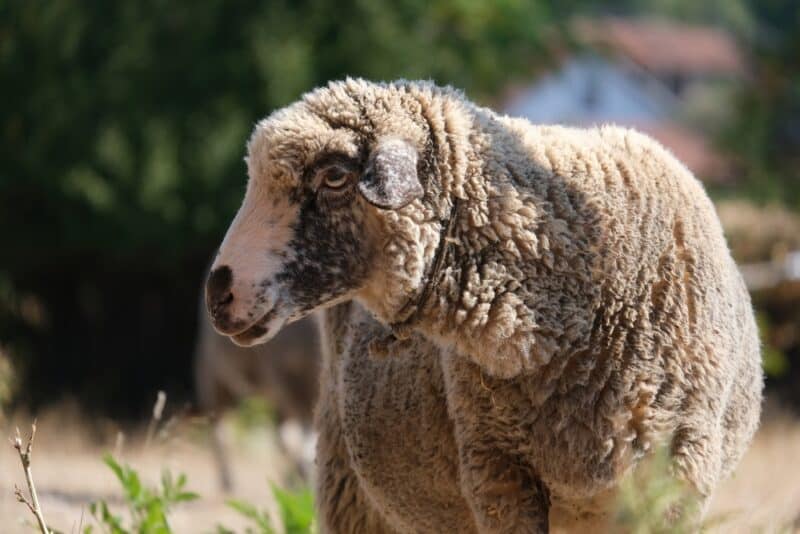
In most cases, sheep will expel worms within a couple of days of being treated.
However, it can take up to 2 weeks for the treatment to take full effect.
Therefore, you should conduct a follow-up worm egg count about 2 weeks after drenching to determine if your program has been effective.
What Are the Symptoms of Worms in Sheep?

There are several symptoms to watch out for if you suspect parasites in your flock.
Some of the most common include:
- Unthriftiness – not eating, losing body condition, or lagging behind the herd
- Weakness and lethargy
- Severe anemia (as indicated by pale eyelids)
- Scouring and dagginess
- Swelling under the jaw (bottle jaw) indicates extreme anemia as related to a barber pole worm infestation
Sheep under stress (drought, winter feed shortages, late pregnancy, and lactation, etc.) are more susceptible to worm infestation, as are young sheep.
What is the Best Wormer for Sheep?
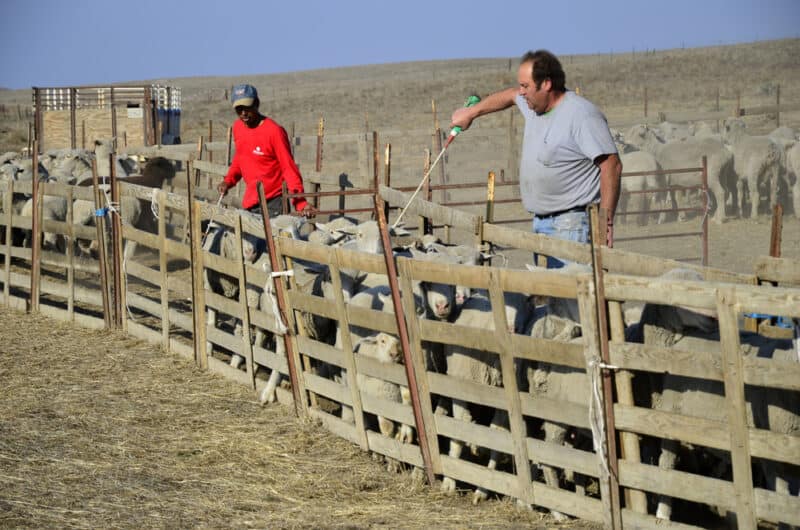
There are a few different dewormers that can be used on sheep. There are three classes of wormers with multiple types within each class. It’s important to note that if a parasite species develops resistance to one class, it will develop resistance to all the wormers within that class.
The three classes are:
- Benzimidazoles – Valbazen, SafeGuard, Panacur
- Avermectins: Ivomec, Cydectin, Eprinex, Dectomax
- Imidazothiazoles: levamisole, Pyranted, Morantel, Tramisol
You’ll have to touch base with your vet to figure out the best one for you, but here are a few general tips:
- Lambs should be dewormed with Cydectin (Moxidectin) or Ivomec (Ivermectin)
- Valbazen (Albendazole) is most effective on tapeworms but should not be used in pregnant ewes
- SafeGuard is not approved for use in sheep but is effective (especially for pinworms) and often used off-label
- Cydectin does not treat tapeworms but is very effective at getting rid of roundworms
- Prohibit (Levamisole) is one of the most effective dewormers at treating the barber pole worm in sheep (which tends to lead to severe anemia, or bottle jaw)
Here’s a helpful chart that will help give you an idea of the best product and dosage for your animals.
Tips for Worming Sheep

Now that you know when and how to worm your sheep, here are some tips for doing so.
1. Select the Right Product
All kinds of dewormers are approved for use in sheep. Most come in liquid form, which is administered with a drench gun or syringe. However, there are also disposable tubes of dewormer paste you can buy.
The format is up to you – it is the product type that is most important to get right.
Check with your vet to find the right dewormer for your animals. Be sure to check the withdrawal time for the medication if you’re raising sheep for meat or milk.
You also need to administer the proper dose. Get an accurate weight for your sheep before you give them any dewormer.
Dose for the heaviest in the group rather than the average size. You need to be wary of overdosing but it’s more dangerous to underdose a sheep as it will not only be ineffective, but can also increase parasite resistance.
2. Use Handling Systems
One of our biggest challenges when deworming sheep is making sure you get the entire flock. However, for a parasite control program to be effective, every member of the flock needs to be treated.
It can be difficult to treat every member of the flock when you have hundreds of animals. Use a marking crayon or spray to indicate which animals have been treated. That way, you won’t miss a sheep or double-dose.
Also, consider using handling systems like pens, chutes, and corrals. This will make it easier to treat your sheep without having to chase them or cause any undue stress.
3. Come Up With a Record-Keeping System
Whether you’re tracking animals in a spreadsheet, taking notes in a binder, or doing something else, make sure you keep reliable records so you have a clear idea of your parasite management program in the past, present, and future.
Don’t rely on memory alone. It’s all too easy to forget when you last treated a sheep, no matter how good you think your memory might be. A record-keeping system will also allow you to track notes of symptomatic sheep or those that became sick or died because of parasites. This information will be essential for you to reference as part of your veterinary care and breeding programs.
4. Lower Stocking Rates
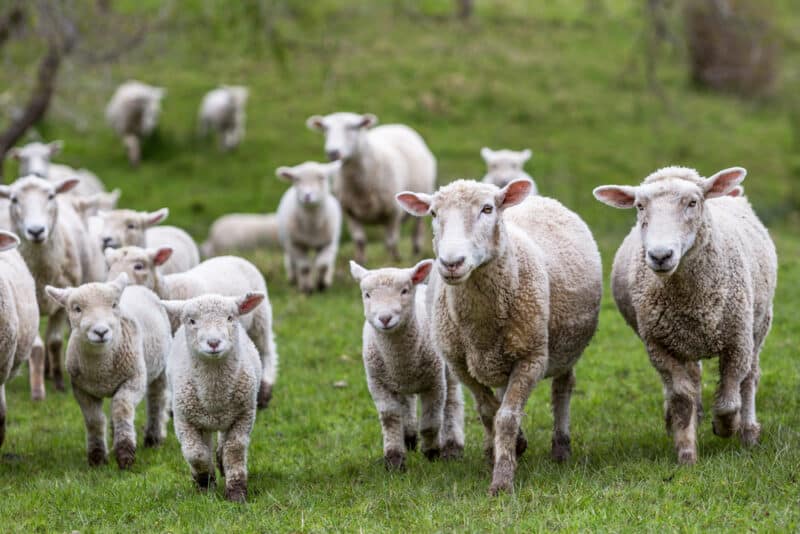
When there are fewer sheep, fewer animals will shed worm eggs in a given area. This reduces parasite loads. Keep as few sheep together as possible to help reduce the frequency with which you need to deworm and minimize resistance.
5. Rotate Out Products
Don’t rely solely on just one product. This is a surefire way to make the parasites resistant to the drug of choice.
Some producers switch out products annually, using Ivermectin one year and Levamisole or Prohibit the next. You can also switch every time you deworm. It’s up to you, but make sure you don’t use the same thing every time.
6. Try “Dose and Move”
Here’s the scary reality when it comes to parasites. It takes just 3 weeks from the time that a worm larva is eaten off the pasture until it becomes a full-fledged, egg-laying adult. Because of this, if you give an animal a wormer and then keep it in the same spot, it’s not going to help the overall worm situation.
Dose and move is a pasture rotation practice in which you give your sheep a dose of dewormer, then immediately move them to fresh pasture.
This helps reduce your sheep’s reliance on anthelmintic drugs by reducing the number of parasites they are exposed to. Allowing them to continue to graze where there’s an active parasite load in the soil will only make the parasites resistant to the chemical you just used.
Ideally, you should move them to a clean pasture (one that has not been grazed in a year) but it should at least be an area where they haven’t been for several weeks or months.
Is Worming Sheep Naturally an Option?

Despite what I’ve said above, it is sometimes okay to NOT worm your sheep at all.
If you’re able to commit to a solid pasture rotation plan that means your sheep are never grazing short grass during vulnerable periods in the height of summer, you can reduce the likelihood of them picking up large volumes of worms.
When the grass is taller – meaning pastures have been rotated or fewer sheep are grazed in a given area – it’s harder for sheep to become infested with worms.
You can also try multispecies grazing. Animals like cattle and horses don’t share worms with sheep and will help scrape up some of the worm eggs from the pasture, leaving fewer for the sheep to pick up.
Selecting sheep with good parasite resistance can help. Check your animals’ eyelids often for paleness by using the FAMACHA scoring system mentioned above.
These tend to be the most effective alternatives to using chemical wormers. Some producers swear by things like garlic and apple cider vinegar. Although I’ve seen these to be effective in animals like chickens and pigs, I haven’t had a lot of luck with sheep – but since they aren’t harmful in any way, they’re worth a shot.
Ultimately, your best line of defense against parasites is solid pasture management. By moving sheep regularly to fresh grass, you can help reduce the frequency with which you need to deworm your sheep.
